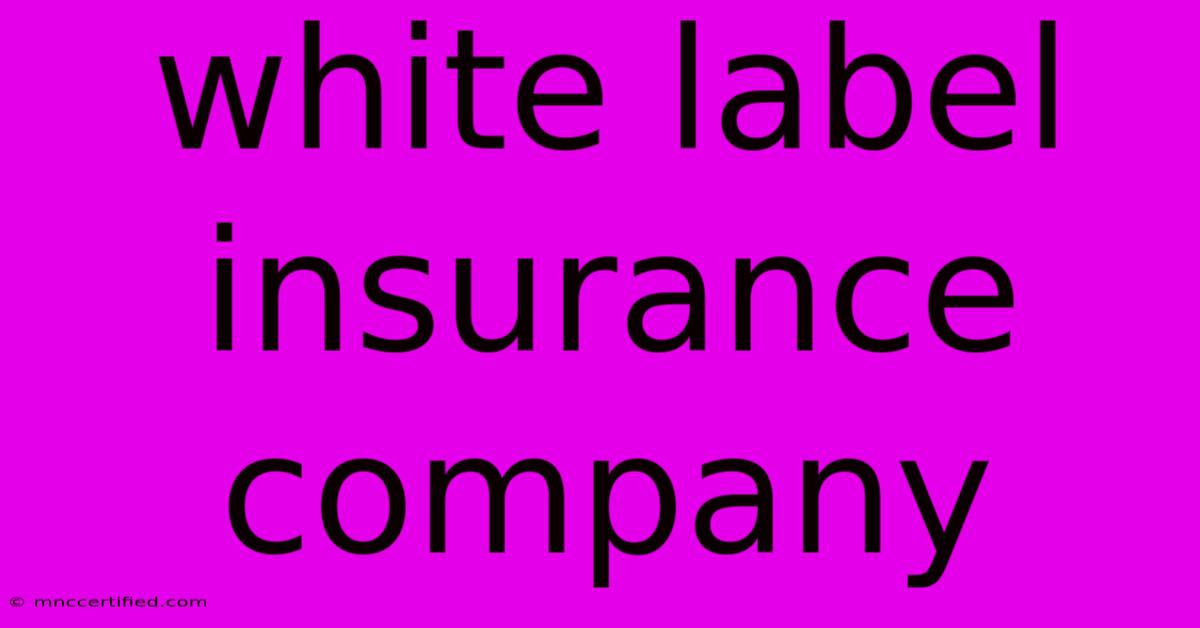White Label Insurance Company

Table of Contents
White Label Insurance Company: A Comprehensive Guide
The insurance industry is vast and complex, presenting both challenges and opportunities. For entrepreneurs and established businesses alike, a white label insurance company offers a compelling route to market. But what exactly is a white label insurance company, and how can it benefit your business? This comprehensive guide will delve into the intricacies of this model, exploring its advantages, disadvantages, and considerations.
What is a White Label Insurance Company?
A white label insurance company provides insurance products and services to businesses that then rebrand and sell them under their own name. Think of it like this: you're buying the product (insurance policies) and the service (the infrastructure, compliance, and administration), but you're selling it as your own. The white label provider handles the back-end operations, allowing you to focus on marketing, sales, and customer relationships. This is a significantly different model than starting your own insurance company from the ground up, requiring substantial capital investment and regulatory hurdles.
Advantages of Partnering with a White Label Insurance Provider
The benefits of using a white label insurance model are numerous, making it an attractive proposition for many:
- Faster Time to Market: Launching your own insurance product can take years. A white label solution drastically reduces this timeframe, allowing you to start generating revenue much quicker.
- Reduced Startup Costs: Avoid the hefty initial investment required for licensing, infrastructure, and technology. White label providers handle these aspects, significantly lowering your upfront costs.
- Lower Operational Overhead: You don't need a large team of actuaries, underwriters, and compliance officers. The white label partner manages these operational complexities.
- Focus on Core Competencies: Concentrate your energy on marketing, customer acquisition, and building your brand, instead of being bogged down in regulatory compliance and operational details.
- Scalability and Flexibility: Easily scale your insurance offerings as your business grows, leveraging the provider's infrastructure to accommodate increased demand.
- Access to a Wider Range of Products: Gain access to a diverse portfolio of insurance products that you might not be able to offer independently. This broadens your appeal to a wider customer base.
- Enhanced Brand Credibility: Partnering with a reputable white label provider can enhance your brand's trustworthiness and credibility.
Disadvantages to Consider
While the advantages are compelling, it's essential to acknowledge potential drawbacks:
- Profit Margins: Your profit margins will be smaller compared to operating your own fully licensed insurance company, as you'll be sharing revenue with the white label provider.
- Dependence on the Provider: Your success is partly reliant on the white label provider's performance and stability. Choose a reputable and financially sound partner.
- Limited Customization: While some customization is usually possible, you may have less control over the specifics of the insurance products compared to a fully independent operation.
- Reputation Risk: If the white label provider experiences issues, it could negatively impact your brand reputation. Thorough due diligence is crucial.
- Contractual Obligations: Carefully review the terms and conditions of the contract to understand your responsibilities and limitations.
Choosing the Right White Label Insurance Provider
Selecting the right partner is paramount. Consider these factors:
- Financial Stability: Ensure the provider is financially secure and has a strong track record.
- Technology and Infrastructure: Assess the quality of their technology platform and its ability to support your business needs.
- Compliance and Regulatory Adherence: Verify that the provider is fully compliant with all relevant regulations.
- Customer Support: Investigate the level of customer support offered and their responsiveness.
- Product Portfolio: Review the range of insurance products available and their suitability for your target market.
- Contract Terms: Scrutinize the contract meticulously before signing.
Conclusion: Weighing the Opportunities and Challenges
A white label insurance company presents a viable and efficient entry point into the insurance market. However, careful consideration of the advantages and disadvantages, coupled with thorough due diligence in selecting a provider, is essential for success. By focusing on your core competencies and leveraging the expertise of a reputable white label partner, you can effectively establish and grow a successful insurance offering. Remember, market research and a clear understanding of your target audience are crucial elements for maximizing the potential of this business model.

Thank you for visiting our website wich cover about White Label Insurance Company. We hope the information provided has been useful to you. Feel free to contact us if you have any questions or need further assistance. See you next time and dont miss to bookmark.
Featured Posts
-
Insurance For Fitness Centers
Nov 29, 2024
-
Traditional Turkey Trot Race
Nov 29, 2024
-
Chelsea Vs Heidenheim Starting Xis
Nov 29, 2024
-
Lip Sync Accusation Against Ariana Madix
Nov 29, 2024
-
Water Investing Michael Burry
Nov 29, 2024